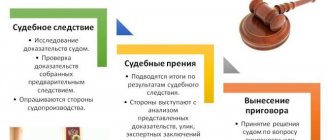1. A court hearing at the request of the defendant to pronounce a sentence without a trial in connection with agreement with the charge brought is held in the manner established by Chapters 35, 36, 38 and 39 of this Code, taking into account the requirements of this article.
2. The court hearing is held with the mandatory participation of the defendant and his defense attorney.
3. Consideration of the defendant’s request for a verdict without a trial begins with the presentation of the charge brought against the defendant by the state prosecutor, and in criminal cases of private prosecution - with the presentation of the charge by the private prosecutor.
4. The judge asks the defendant whether he understands the charges, whether he agrees with the charges and whether he supports his petition for a verdict without a trial, whether this petition was submitted voluntarily and after consultation with a defense lawyer, whether he understands the consequences of a verdict without a trial . When the victim participates in the court hearing, the judge explains to him the procedure and consequences of passing a sentence without a trial and ascertains his attitude to the defendant’s petition.
5. The judge does not conduct a general examination and assessment of evidence collected in a criminal case. In this case, circumstances characterizing the personality of the defendant, and circumstances mitigating and aggravating the punishment can be examined.
6. If the defendant, public or private prosecutor, or victim objects to the sentencing without a trial or on his own initiative, the judge makes a decision to terminate the special procedure of the trial and order the consideration of the criminal case in the general procedure.
7. If the judge comes to the conclusion that the accusation agreed with by the defendant is justified and supported by evidence collected in the criminal case, then he will pronounce a guilty verdict and assign the defendant a punishment that cannot exceed two-thirds of the maximum term or amount of the most severe type of punishment provided for the crime committed.
8. The descriptive and motivational part of the guilty verdict must contain a description of the criminal act, the charge of which the defendant agreed to, as well as the court’s conclusions about compliance with the conditions of the verdict without a trial. The judge's analysis of the evidence and its assessment are not reflected in the verdict.
9. After pronouncing the verdict, the judge explains to the parties the right and procedure for appealing it, provided for in Chapter 45.1 of this Code.
10. Procedural costs provided for in Article 131 of this Code are not subject to recovery from the defendant.
Grounds for holding a preliminary hearing in criminal proceedings and the timing of its appointment
The norms of Part 2 of Art. 229 of the Code of Criminal Procedure of the Russian Federation defines the grounds for holding a preliminary hearing:
- petition of the parties to join criminal cases (cases are joined under Article 139.2 and 153 of the Criminal Procedure Code of the Russian Federation);
- the basis for separating a criminal case (a case is segregated under Article 139.1 of the Code);
- a sentence that has not entered into force if the person against whom a new criminal case has been filed has a suspended sentence for a crime he committed in the past;
- settlement of nuances in the consideration of a criminal case (CD) by a court with a jury;
- petition of the party to carry out proceedings in court under Part 5 of Art. 247;
- grounds for suspension or termination of the case (they are provided for in Articles 238 - 239);
- grounds for returning the case to the prosecutor (under Article 237 of the Code);
- a request of a party that excludes any evidence when it is stated under Part 3 of Art. 229.
At least one such ground must be present for a preliminary hearing to be held.
The deadline for scheduling a preliminary hearing in a criminal case is specified in Part 3 of Art. 227 Code of Criminal Procedure of the Russian Federation. According to this norm, it amounts to a maximum:
- 30 days from the date of receipt of the UD by the court - in the usual manner;
- 14 days from the date of such receipt - in cases where the accused are kept in custody.
According to Part 4 of Art. 227 of the Code of Criminal Procedure of the Russian Federation, copies of the judge’s decision that sets the hearing are sent to:
- to the prosecutor;
- to the victim;
- to the accused.
Commentary on Article 316 of the Code of Criminal Procedure of the Russian Federation
1. In addition to the circumstances specified in part 4 of this article, the judge also asks the defendant whether he fully agrees not only with the accusation, but also with the civil claim, if one is filed.
2. If several persons are accused in a case, and only one accused has filed a petition for a verdict without a trial, such a case against all accused should be considered in the general manner.
3. The judge makes a verdict based on the evidence already collected in the criminal case at that time. Research (verification) and assessment of evidence collected in a criminal case in the general manner are not carried out (Part 5 of Article 316). This means that, as a general rule, a judicial investigation is not conducted at a court hearing, that is, investigative actions are not carried out, testimony and protocols of investigative actions, expert opinions and other documents are not read out. An exception is provided only for the study of circumstances characterizing the personality of the defendant, as well as circumstances mitigating and aggravating the punishment. It can be carried out by all methods provided for by the criminal procedure law, including by examining additionally presented materials, as well as interrogating witnesses on these circumstances <1>. The judge's assessment of the evidence has, to a certain extent, a special character. Thus, the judge must evaluate the evidence presented mainly based on the written materials of the case and make sure that the accusation with which the defendant agreed is legal, justified and supported by the evidence available in the case materials (Part 7 of the article). However, the judge’s analysis of the evidence and its assessment are not reflected in the verdict. Only a description of the criminal acts is provided, as well as the court’s conclusions about compliance with the conditions of the sentence without a trial. At the same time, the sentencing of the defendant must be motivated in the sentence.
——————————— <1> See: paragraph 10 of the Resolution of the RF Supreme Court of December 5, 2006 N 60 “On the application by courts of a special procedure for the trial of criminal cases” // BVS of the Russian Federation. 2007. N 2.
4. Since the court examines only the circumstances characterizing the personality of the defendant, and the circumstances mitigating and aggravating the punishment (part 5 of the article), it does not have the right to deny the parties the opportunity to participate in the debate, and the defendant to speak out on these issues in the last word in the order , provided for in Art. Art. 292 and 293.
5. The law is silent on what the judge should do if he comes to the conclusion that, despite the defendant’s agreement with the prosecution, the evidence collected by the prosecution during the preliminary investigation is not convincing enough and it is impossible to give it a final assessment without direct examination in the conditions of the judicial investigation. In particular, can he order an acquittal or a full trial? In previous editions of this commentary, the point of view was defended that the law does not contain obstacles to an acquittal in these cases and in a special procedure <1>. In doing so, we put forward the following arguments. In the articles chap. 40 does not contain a prohibition on the acquittal of the defendant. In part 7 rooms. The article only states that “if the judge comes to the conclusion that the accusation agreed with by the defendant is justified and supported by the evidence collected in the criminal case, then he will pronounce a guilty verdict.” This provision is not at all equivalent to a prohibition on an acquittal if the judge is satisfied that the charge is completely unfounded. Otherwise, the acquittal is subject to undue discrimination. In fact, why is it possible to pronounce a guilty verdict without directly examining the evidence supporting the accusation, but it is impossible to pronounce a verdict of acquittal? After all, doubts are interpreted in favor of the defendant. It should be remembered that the purpose of criminal proceedings is that “criminal prosecution and the imposition of a fair punishment on the guilty correspond to the purpose of criminal proceedings to the same extent as the refusal to prosecute the innocent, releasing them from punishment, and the rehabilitation of everyone who was unreasonably subjected to criminal proceedings.” persecution” (Part 2 of Article 6). If there is insufficient incriminating evidence, the court, by sending the case for trial in the general manner, would thereby initiate the continuation of activities to substantiate the accusation and perform an accusatory function unusual for the court. When agreeing to a verdict in a special manner, the prosecution must bear the full burden of proof, i.e. accept the adverse consequences of failure to prove the accusation, incl. in the form of an acquittal of the defendant.
——————————— <1> See: Smirnov A.V., Kalinovsky K.B. Commentary on the Criminal Procedure Code of the Russian Federation. St. Petersburg: Knorus, 2004.
Initially, the Plenum of the Armed Forces of the Russian Federation, in paragraph 28 of its Resolution No. 1 dated 05.03.2004 “On the application by courts of the norms of the Criminal Procedure Code of the Russian Federation” insisted that when considering a case in a special order (Section X of the Code of Criminal Procedure of the Russian Federation), only a guilty verdict is provided . Therefore, in cases where the judge, before passing a sentence, determines that there are any circumstances in the case that prevent a conviction, or there are grounds for changing the classification of the crime, dismissing the case or acquitting the defendant, he makes a decision to terminate the special procedure for the trial and appoints consideration of the criminal case in accordance with the general procedure.
However, later the Plenum of the Supreme Court of the Russian Federation, in Resolution No. 60 dated December 5, 2006 “On the use by courts of a special procedure for the trial of criminal cases,” recognized that Chapter 40 of the Code of Criminal Procedure of the Russian Federation does not contain rules prohibiting the adoption in a case considered in a special procedure, other than a guilty verdict , court decisions, in particular, what the accused has done can be reclassified, and the criminal case itself can be terminated (for example, due to the expiration of the statute of limitations, changes in the criminal law, reconciliation with the victim, amnesty, refusal of the state prosecutor to charge), etc., if this does not require examination of the evidence collected in the case and the factual circumstances do not change (clause 12 of the Resolution). At the same time, the Plenum declared its previous clarifications (2004) on this issue to be invalid. Thus, now neither the law nor the resolutions of the Plenum of the Armed Forces of the Russian Federation contain any prohibition on the issuance in a special manner of court decisions other than a guilty verdict, in particular an acquittal. However, since the study and assessment of evidence collected in a criminal case is impossible here, then if clarification of new factual circumstances of the case is required to reach a verdict, the court must make a decision to terminate the special procedure for trial and order the consideration of the criminal case in a general manner.
6. Resolution of the Plenum of the Armed Forces of the Russian Federation dated December 5, 2006 N 60 also declared invalid the previous explanation contained in paragraph 28 of its Resolution dated March 5, 2004 N 1, that if the defendant disagrees with the grounds or scope of the civil claim brought, his petition for rendering a sentence without a trial is not subject to satisfaction. In these cases, the case should be considered on a general basis. From this it could be concluded that a special procedure can also be applied in the case of a civil claim, provided that the defendant does not challenge it. However, in Resolution No. 60 of 05.12.2006 “On the use by courts of a special procedure for the trial of criminal cases,” the Plenum of the Supreme Court of the Russian Federation took a slightly different position: “If a civil claim is brought in a criminal case considered in a special procedure, then, if there are appropriate grounds, it can be left without satisfaction, the proceedings on it are terminated, its satisfaction may be refused, or the claim may be decided to transfer it for consideration in civil proceedings, if this does not entail a change in the factual circumstances of the case” (paragraph 12). At the same time, taking into account the cancellation of the previously given clarification on the issue of a civil claim when making a court decision in a special manner, it becomes unclear whether the court can satisfy a civil claim, even if the defendant fully agrees with it? In our opinion, the new clarification of the Plenum leaves open the possibility of satisfying a civil claim, since it speaks only of cases where there are grounds that prevent the satisfaction of the claim. If there are no such grounds, the civil claim can be satisfied if the defendant agrees with it.
The procedure for conducting a preliminary hearing in criminal proceedings
Based on Art. 234 of the Code of Criminal Procedure of the Russian Federation, a preliminary hearing in a criminal case takes place in the following mode.
The parties call by notice, which must be sent in advance - at least three days before the date of the preliminary hearing. The accused may be absent if a corresponding petition is sent on his behalf or on behalf of one of the parties. If other participants notified on time do not appear at the hearing, it will not be postponed and will take place without them.
In case of an exclusive evidentiary request of the party, which is submitted within the framework of Art. 235 of the Code of Criminal Procedure of the Russian Federation, the judge determines whether there are any objections. If there are none, such a request is granted. Then a court hearing is scheduled.
A request for additional evidence or items submitted by the defense will be granted if these additions are valuable to the case.
Those who know anything about the investigative actions carried out, the seizure and inclusion of documents in the criminal record, can (at the request of the parties) be questioned as witnesses. Only holders of witness immunity are not interrogated in this regime (clause 40 of Article 5 of the Code).
Minutes are taken during the hearing.






